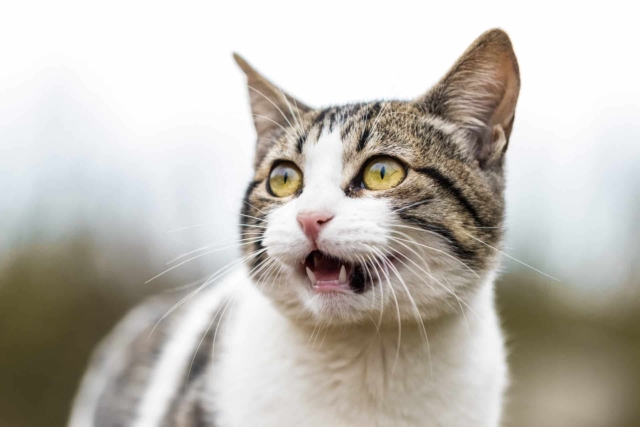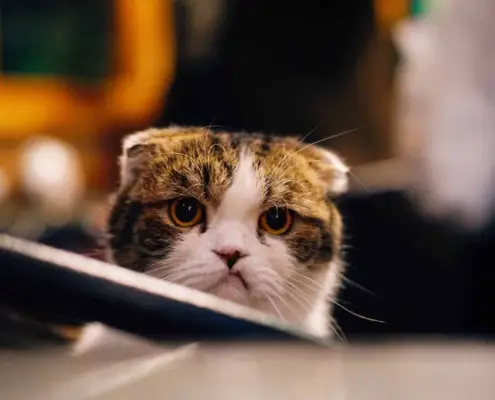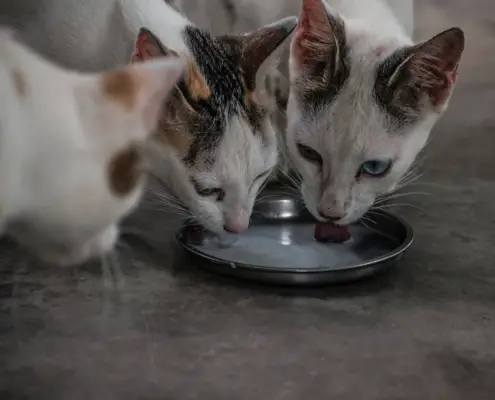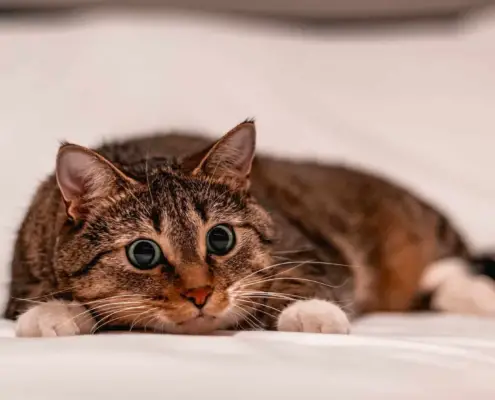
Cats are fascinating creatures with unique behaviors that often leave us puzzled and intrigued. One such behavior that can catch us off guard is drooling. Many cat owners find themselves wondering why their feline companions drool and what it signifies. In this article, we will delve into the world of feline physiology to uncover the surprising reasons behind cat drooling and provide insights on how to interpret this behavior.
The normal reasons why cats drool
Contrary to popular belief, drooling in cats can be perfectly normal and harmless. One of the most common reasons for cat drooling is contentment. When cats are in a state of deep relaxation or experiencing pure bliss, they may start to drool. This often occurs during moments of intense petting or when they are curled up in their favorite spot, enjoying a peaceful nap. So, if you notice your cat drooling while being pampered, consider it a sign that they are in a state of utter contentment.
Another normal reason for cat drooling is anticipation of food. Cats have a powerful sense of smell, and when they catch a whiff of something appetizing, their salivary glands kick into overdrive. This increased salivation can lead to drooling, especially if the food is particularly enticing. So, if your cat starts drooling at the mere sight of their favorite treat or mealtime approaching, it’s simply a natural response to their heightened excitement.
Medical conditions that can cause excessive drooling in cats
While drooling can be normal in certain situations, excessive drooling in cats may indicate an underlying medical condition that requires attention. One such condition is dental disease. Cats, like humans, can suffer from dental problems such as gum disease, tooth decay, or oral infections. These issues can cause pain and discomfort, leading to excessive drooling. If you notice your cat drooling excessively and exhibiting signs of oral discomfort, such as reluctance to eat or pawing at their mouth, it’s crucial to consult a veterinarian for a proper diagnosis and treatment.
Another medical condition that can cause excessive drooling in cats is nausea or gastrointestinal problems. Cats may drool excessively if they have an upset stomach, suffer from acid reflux, or have ingested something toxic or irritating. In such cases, it’s important to observe your cat’s behavior for any additional symptoms like vomiting, diarrhea, or a loss of appetite. If these symptoms persist or worsen, seeking veterinary attention is essential to identify and address the root cause of the issue.
How to interpret cat drooling behavior
Understanding your cat’s drooling behavior can provide valuable insights into their overall well-being. As mentioned earlier, drooling during moments of contentment or in anticipation of food is typically normal. However, if your cat starts drooling excessively without any apparent reason or shows signs of discomfort, it’s important to pay attention and take appropriate action.
Excessive drooling accompanied by other symptoms such as lethargy, decreased appetite, or changes in behavior can be an indication of an underlying health issue. It’s essential to monitor your cat closely for any changes in their daily routine or behavior patterns. Keeping a record of the frequency and duration of drooling episodes can help your veterinarian in making an accurate diagnosis.
Tips for managing excessive drooling in cats
If your cat is experiencing excessive drooling due to a medical condition, there are several steps you can take to manage and alleviate their discomfort. First and foremost, consult a veterinarian to determine the underlying cause of the excessive drooling. The treatment plan will depend on the specific condition your cat is facing.
In cases of dental disease, your veterinarian may recommend a thorough dental cleaning, extraction of infected teeth, or antibiotics to address any oral infections. Providing your cat with regular dental care, such as brushing their teeth or offering dental treats, can help prevent dental issues and reduce the occurrence of excessive drooling.
For cats with gastrointestinal problems, your veterinarian may suggest dietary changes, medication, or additional diagnostic tests to identify the root cause of the issue. Following the recommended treatment plan and providing a suitable diet can help manage the excessive drooling and improve your cat’s overall digestive health.
When to seek veterinary attention for cat drooling
While occasional drooling is usually nothing to worry about, certain situations warrant immediate veterinary attention. If your cat suddenly starts drooling excessively, especially if it is accompanied by other concerning symptoms such as difficulty breathing, seizures, or collapse, it could indicate a medical emergency. In such cases, do not hesitate to contact your veterinarian or an emergency veterinary clinic for immediate assistance.
Additionally, if your cat’s drooling persists or worsens despite your best efforts to manage it, it’s crucial to seek veterinary attention. Your veterinarian will be able to conduct a thorough examination, perform any necessary diagnostic tests, and provide appropriate treatment options based on their findings.
Common misconceptions about cat drooling
There are several misconceptions surrounding cat drooling that are worth addressing. One common misconception is that all cats drool excessively when they are happy. While some cats may indeed drool in moments of bliss, not all cats exhibit this behavior. Each cat is unique, and their response to certain stimuli can vary. Therefore, it’s important to understand that drooling is not a definitive indicator of a cat’s happiness.
Another misconception is that drooling is always a sign of a serious health issue. While excessive drooling can be a symptom of an underlying medical condition, it is not always the case. As discussed earlier, cats can drool for normal reasons such as contentment or anticipation of food. It’s essential to assess the overall health and behavior of your cat, rather than solely relying on drooling as a diagnostic tool.
Preventive measures to reduce the occurrence of cat drooling
While some causes of cat drooling cannot be prevented, there are a few preventive measures you can take to reduce the occurrence of excessive drooling. Regular dental care, including brushing your cat’s teeth, can help maintain their oral hygiene and prevent dental disease. Offering appropriate chew toys and dental treats can also contribute to good oral health and reduce the likelihood of drooling caused by dental issues.
Maintaining a balanced and suitable diet for your cat can help prevent gastrointestinal problems that may lead to excessive drooling. Consult with your veterinarian to ensure you are providing the right type and amount of food for your cat’s specific needs.
Case studies: Real-life examples of cat drooling and its causes
To further illustrate the various causes and interpretations of cat drooling, let’s explore a couple of real-life case studies.
Case Study 1: Mr. Whiskers, a seven-year-old domestic shorthair cat, started drooling excessively and pawing at his mouth during mealtime. After a thorough examination, it was discovered that Mr. Whiskers had a broken tooth, causing pain and discomfort. The veterinarian performed a dental extraction, and Mr. Whiskers’ excessive drooling resolved.
Case Study 2: Bella, a three-year-old Siamese cat, exhibited excessive drooling along with vomiting and a loss of appetite. After running diagnostic tests, the veterinarian diagnosed Bella with gastritis, an inflammation of the stomach lining. Bella’s diet was modified, and she was prescribed medication to manage her condition. With appropriate treatment, her excessive drooling diminished, and her overall health improved.
These case studies highlight the importance of veterinary intervention in identifying and addressing the underlying causes of cat drooling.
Understanding and embracing cat drooling behavior
In conclusion, cat drooling can have both normal and medical reasons. Understanding the various factors that contribute to cat drooling and how to interpret this behavior can help you provide the best care for your feline companion. Remember to pay attention to any changes in your cat’s drooling behavior, especially if it becomes excessive or is accompanied by other concerning symptoms. Seeking veterinary attention when necessary and following the recommended treatment plan can ensure your cat’s well-being and help manage any underlying health issues. Embrace your cat’s unique behaviors, including drooling, and continue to provide them with love and care.
If you have any concerns about your cat’s drooling behavior, consult your veterinarian for a thorough evaluation and guidance.
If you enjoyed my article, I would appreciate you sharing it with your network.

Sima Ndlebe
Sima writes for CatBuzz. He is interested in Cats, Health and Fitness, and Entrepreneurship.
Published: 17 November 2023
Related Articles
Disclaimer
The content found on CatBuzz.org is presented on an "as is" basis and is intended for general consumer information and education purposes only. Any utilization of this information is voluntary and solely at the user's own risk.
None of the articles or content should be regarded as, or used in place of, veterinary medical advice, diagnosis, or treatment. The information provided on the website is purely for educational and informational intentions and should not be considered a substitute for professional guidance from a veterinarian or other qualified expert. The articles are designed to inform consumers about veterinary healthcare and medical matters that may impact their cat's daily life. It should be noted that this website and its services do not constitute the practice of any form of veterinary medical advice, diagnosis, or treatment. CatBuzz.org explicitly disclaims any liability for any direct or indirect damages or losses that may arise from the use of or reliance on the information contained within the content.
Consumers must consult a veterinarian, veterinary specialist, or another qualified veterinary healthcare provider when seeking advice regarding their cat's health or medical conditions. It is important not to ignore, avoid, or postpone seeking medical advice from a veterinarian or other qualified veterinary healthcare provider solely based on information obtained from this website. If you believe that your cat may be experiencing a medical issue or condition, it is imperative to promptly contact a qualified veterinary healthcare professional.



